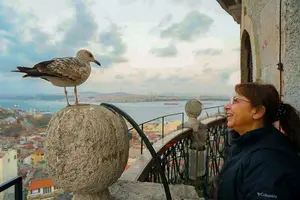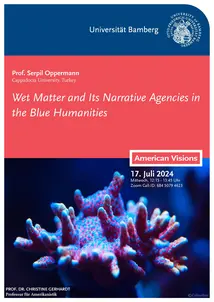Prof. Serpil Oppermann (Cappadocia University, Türkiye): "Wet Matter and Its Narrative Agencies in the Blue Humanities"
Wednesday, July 17, 2024, 12:15-1:45 p.m., via Zoom (Meeting-ID: 684 5079 4623)
Are our planetary waters and their inhabitants storied, exercising some degree of expressive creativity? What are the messages encoded in the agency of water and its aquatic beings? How do we read this semiotic creativity in planetary waters?
These are the specific questions Prof. Oppermann brings to the Blue Humanities, a transdisciplinary field of study working at the intersections of the physical sciences and the "planetary poetics of water" (Mentz 2023). Answering these questions requires a new method that combines both scientific research and poetic imagination in human-water interactions, which she calls "scientific poetics of planetary waters." According to Oppermann, scientific data provides ample evidence for the communication processes among water-dwelling beings, while their expressive capacities, communication skills, and semiotic creativity unfold in a poetics that draws inspiration from material ecocritical concepts of storied matter and narrative agencies. Reading the messages of wet matter requires both creative and critical thinking, as well as scientific research conducted on nonhuman languages. This method, in other words, combines the "arts of imagination" with scientific specifications from oceanography and limnology. It opens a field of complementarity for exploring how aquatic voices speak within, to, and with one another, inviting us to respond to their messages for the sake of shared terraqueous futures. The scientific poetics of planetary waters revitalizes relational thought known as thinking with water in the blue humanities and can aid in understanding and engaging with the stories of aquatic life forms in precarious times.
In her talk, she argued that such a perspective can predictably lead to the desired shift in awareness, perception, imagination, and interpretive strategies so that constructive action can ensue. Her examples were coral reefs as storied subjects with meaningfully articulate forms of creative becoming and their communicative relations through which they construct a semiotic environment to survive.

Professor of environmental humanities and director of the Environmental Humanities Center at Cappadocia University, Serpil Oppermann is the author of Ecologies of a Storied Planet in the Anthropocene (West Virginia UP, 2023) and Blue Humanities: Storied Waters in the Anthropocene (Cambridge UP, 2023). She is also the editor and co-editor of seven collections and over 100 essays and articles on ecocriticism and environmental and blue humanities. She is currently co-editing The Bloomsbury Handbook to the Blue Humanities, forthcoming in 2026. She has served as the 7th President of EASLCE (European Association for the Study of Literature, Culture, and Environment) (2016–2018). She is one of the signatories to the "World Scientists' Warning to Humanity: Second Notice" (2017) and the "World Scientists' Warning of Climate Emergency" (2020). She is also a member of the Advisory Council of METI (Messaging Extraterrestrial Intelligence: http://meti.org/advisors). With Serenella Iovino, she helped develop material ecocriticism, an ecocritical theory that she continued to expand on, further exploring the expressive creativity of everything that is more-than-human in the intersections of science studies and the environmental and blue humanities.
Also: There's a New Blue Humanities book series forthcoming! More information avalaible HERE(1.0 MB)!
